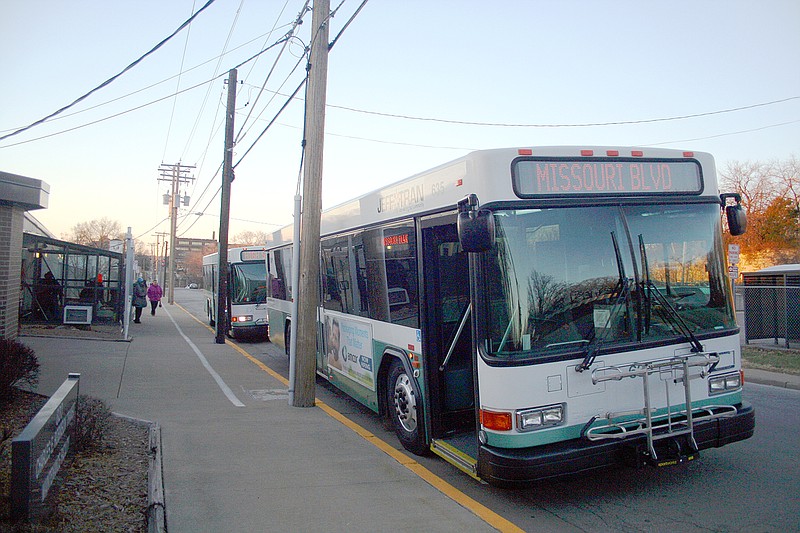While popularly requested additional routes for JeffTran on weekends and evenings may not be in the near future, there are other improvements in the works for the city's transit system.
Jefferson City Transit Division Director Mark Mehmert said there are some changes coming down the line for the city bus system including a possible new transit facility, improvements to the bus barn and a new paratransit system.
The city's Transit Division recently received a grant from the federal government for $409,953. In general, about $900,000 of the division's $2.5 million annual budget comes from the federal government, $1.2 million comes from the city and about $170,000 comes from bus fare revenue.
In 2017, JeffTran and the Capital Area Metropolitan Planning Organization conducted an online community survey, which found 57 percent of respondents wanted JeffTran to add a Saturday service.
The buses currently run through six fixed routes between 6:40 a.m-6 p.m. Monday through Friday.
The cost of extending the hours of bus routes or adding days would fall to the city because the federal amount is based on a formula that wouldn't change with the added service hours, Mehmert said.
A study conducted by contractor Lochmueller Group in 2017 found adding a Saturday service would create an additional operating cost of $230,000, with fare revenue covering only $15,000 (about 6.5 percent). Added weekday services would add an operating cost of $224,000, with only $21,000 covered by fare revenue (about 9.4 percent).
"Operationally, it's hard to see how the city would be able to commit that kind of resources to expanding transit service," Mehmert said.
There are other services in the city that need the money, he said, like stormwater drains, overlay programs and public safety.
"Those are things that the citizens rightfully ask for and want and need, and competing with those interests for something - we can't expect to take away from those," he said.
Mehmert said it's possible the recent natural disasters - spring flooding and the May 22 tornado - could impact the city's budget and, in turn, the JeffTran budget, but he doesn't anticipate any reduction in the current services provided.
With the federal grant - which will be supplemented with about $100,000 from the division's budget to bring the total up to the half-million mark - several improvements are planned for the coming years, Mehmert said.
The majority of those will go to the JeffTran bus barn, which was built around 1994 and needs several repairs and improvements, he said.
In February, the Transit Division had hoped to purchase five new heaters for the bus barn. The heaters are original to the building, and only two of them work, Mehmert said. They had hoped to use an increase in the buildings and grounds maintenance fund to buy the heaters, but they weren't able to.
Instead, they now want to use a portion of the grant to buy the heaters. In February, it was estimated the heaters could cost up to $24,000.
New overhead doors are also anticipated for the bus barn and bus wash facility. Mehmert said maintenance to the existing, original doors has likely been costing more than it would take to replace them.
They also hope to update the bus wash facility, which is about 12 years old.
"Those facilities, constantly in wet conditions, wear out quickly," Mehmert said, noting they usually last about 10 years.
Updating the conditions for storing, repairing and maintaining the buses will help keep them in good shape.
The fleet is made up of buses that are from 2005-06 or 2010-11, he said. All but one have more than 300,000 miles on them. Mehmert said they hope to change the bus mix in the next few years, as well.
He said they also hope to switch software systems for the paratransit system known as Handi-Wheels, an "origin to destination" service for people who qualify under the Americans with Disabilities Act that picks up clients and takes them anywhere within the city limits.
In January, the Transit Division started the process of re-certifying Handi-Wheels riders to ensure they were still eligible under ADA.
"Right now, we use a home-brew, in-house-built system, and we're looking toward moving to a commercial product that is specifically meant for running a paratransit system that will allow us to do on-the-fly dispatch," Mehmert said.
The current system was created by the Transit Division and has its weaknesses, he said. A new commercial system would operate digitally, cut down on errors and allow messages to go out into the field to idle drivers.
The most long-term project would be a new transit facility, which could come in the next five years or so, Mehmert said, but would require some federal partnerships.
"The bottom line for us is that we may not be looking at new hours at the moment, but we are making substantial investments in the transit system to better serve our riders," Mehmert said. "We work hard every day to try to do the best we can with the resources that we have available, making sure that we're providing a public transportation system to the citizens of the City of Jefferson."

